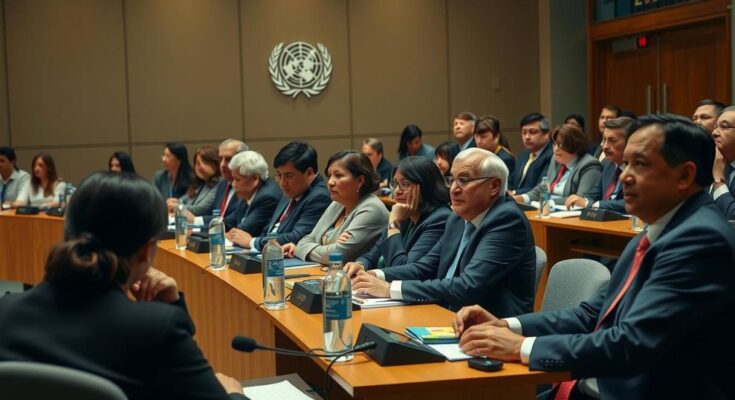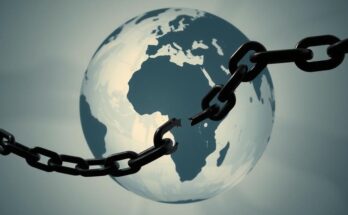Amnesty International reports severe human rights abuses in Ecuador as President Noboa nears his first year in office. Under his administration, security policies, notably the “Plan Fenix,” have led to thousands of arrests, torture, and extrajudicial killings amid a militarized response to violence. The situation demands immediate international scrutiny and accountability, particularly as the UN Human Rights Committee prepares to evaluate Ecuador’s practices.
As President Daniel Noboa approaches his first anniversary in office, Amnesty International highlights a troubling decline in human rights protections under his administration. With violence surging, Noboa has adopted stringent security policies, branding drug trafficking groups as “terrorists” and frequently declaring states of emergency under his controversial “Plan Fenix.” Amnesty’s briefing raises alarms over reported human rights abuses, including mass arrests, torture, and extrajudicial killings carried out by security forces. Noboa’s approach began in January 2024, after violent incidents linked to drug gangs in Guayaquil, prompting a nationwide state of emergency that placed the military in charge of prisons. Although the official state of emergency lapsed in April, Noboa’s routine renewals have transformed temporary measures into prolonged restrictions on civil liberties. The military’s engagement in civilian security raises concerns, with concerns that such tactics could threaten human rights protections. Amnesty International’s own assessments have not confirmed an armed conflict in Ecuador, yet the organization urges that humanitarian law and civil protections must coexist, irrespective of the violence encountered. The lack of clarity surrounding the arrests made under \’Plan Fenix\’ exacerbates fears of due process violations, with thousands detained without sufficient legal justification. Notably, reports show police and military personnel committing serious abuses, from executions to torture. The rise in such incidents is stark; prior years saw minimal recorded abuses, yet January to July 2024 alone have shown substantial increases, suggesting systemic failings in the enforcement of rights amid heightened military operations. The organization has unearthed troubling accounts, such as the shooting of 19-year-old Carlos Javier Vega Ipanaque, allegedly killed unprovoked by soldiers. Another incident of enforced disappearance surfaced involving two young men during a military sweep, further heightening anxieties about military transparency and accountability. Human rights defenders, already in precarious situations, have faced rising risks amid increased military duties. Notably, Noboa’s public dismissal of these defenders, labeling them as “antipatriotic,” aggravates the atmosphere of hostility and stigma surrounding advocacy work. Efforts by organizations for increased dialogue with officials have often met with resistance, including barriers to accessing vital human rights data. In Ecuador’s prisons, conditions have reportedly worsened since the military’s August 2024 intervention began. Allegations of severe ill-treatment and torture have emerged, exemplified by alarming reports of neglect in providing basic needs such as food and medical care for inmates—an obligation the state must fulfill. Reports of family visitation restrictions echoed international demands, but only resumed after sustained advocacy and pressure from outside bodies. Another grim statistic includes the Ombudsman’s Office shattering its previous alert records for prisoner treatment, highlighting a staggering rise in reported abuses. Tragically, multiple prison officials have suffered fatal attacks, raising further questions about safety inside these facilities and the overall justice framework. In light of this troubling dynamic, international oversight is more critical than ever. As Ecuador’s human rights situation gets reviewed by the UN Human Rights Committee, the opportunity for accountability and reform stands, with agencies, particularly the United States, urged to ensure funding aligns with human rights compliance in security practices.
The context of this report centers on the deteriorating human rights conditions in Ecuador under President Daniel Noboa, who has employed a heavy-handed approach in response to rising violence largely attributed to drug trafficking. His administration’s strategy, dubbed “Plan Fenix,” is characterized by frequent emergency declarations and military involvement in security measures, which have drawn significant criticism from human rights organizations like Amnesty International. This situation unfolds against a backdrop of escalating human rights abuses, particularly against vulnerable populations, amidst allegations of torture, extrajudicial killings, and systemic violations of due process.
The precarious state of human rights in Ecuador under President Noboa underscores an urgent need for reform and accountability. Amnesty International’s findings reveal a troubling trajectory marked by excessive military involvement in civil matters, resulting in numerous abuses and a climate of fear. With the looming UN review, there is a critical opportunity for both national and international stakeholders to champion human rights, demanding transparency and an end to impunity in Ecuador’s security policies.
Original Source: reliefweb.int



